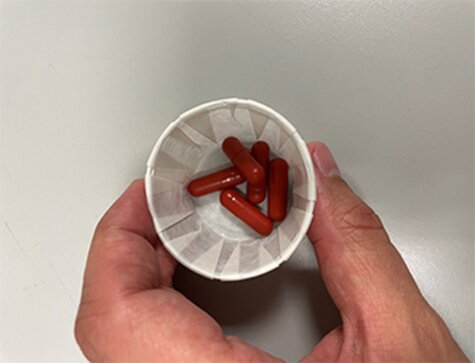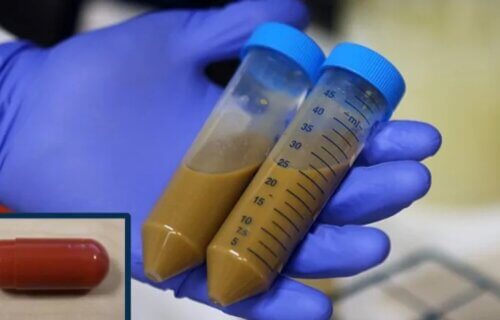LONDON — A fecal transplant clinical trial is underway in the United Kingdom and scientists say it has the potential to treat advanced liver disease and combat the growing threat of antimicrobial resistance. Led by researchers at King’s College London, the trial aims to determine whether Fecal Microbiota Transplant (FMT) capsules derived from healthy donors can reduce the risk of infections in patients with cirrhosis, a severe form of liver disease.
Cirrhosis, characterized by irreversible scarring of the liver, is the third leading cause of mortality and loss of working life in the U.K. Patients with cirrhosis often have an imbalance of harmful bacteria in their bowels, rendering them highly susceptible to infections. Moreover, overuse of antibiotics has led to the rise of drug-resistant infections, making treatment increasingly challenging. The PROMISE trial aims to address these issues and evaluate the efficacy of FMT capsules in reducing infections among cirrhosis patients.
“This landmark trial provides evidence that a fecal transplant can improve gut health by modifying the gut microbiome and reduce ammonia levels in patients with cirrhosis,” says study lead author Professor Debbie Shawcross in a university release.
Shawcross emphasized the importance of the trial, stating, initial findings from the PROFIT trial, which administered FMT via endoscopy, were encouraging, demonstrating that FMT is safe and effective in modifying gut microbiota and enhancing the body’s immune response. The next phase of the study, the PROMISE trial, will involve administering FMT capsules to patients, eliminating the need for invasive endoscopic procedures.
“Patients told us that they would prefer to take tablets rather than have an endoscopy. The ‘crapsules,’ which have none of the taste or smell as the name suggests, may offer new hope for patients with cirrhosis who are out of treatment options,” Prof. Shawcross explains.

The British Liver Trust, a collaborator in the PROMISE trial, expressed its support for the research.
“We are delighted to support this innovative research that could become a life-changing treatment for patients. Not only can untreatable infections be serious themselves, but they can also trigger further serious complications,” says Pamela Healy, Chief Executive of the British Liver Trust, highlighting the potentially life-changing impact of the treatment.
The PROMISE trial, funded by the National Institute of Health Research UK (NIHR), aims to recruit 300 patients from multiple sites across the country. Participants will be randomly assigned to receive either FMT capsules or a placebo every three months for two years. The study holds promise not only for patients with cirrhosis but also for addressing the global challenge of antimicrobial resistance.
“There is an urgent and unmet need to tackle infection and antimicrobial resistance in chronic liver disease. If we can boost liver patients’ own immunity to reduce infections by modifying the microbiome, we can reduce the need for the prescription of antibiotics. This will reduce the incidence of antimicrobial resistance, which is a huge global challenge,” explains Dr. Lindsey Edwards from King’s College London.
The commencement of the PROMISE trial marks a significant step toward finding effective and alternative treatment options for patients with cirrhosis while addressing the pressing issue of antimicrobial resistance. The outcomes of this pioneering research have the potential to transform healthcare systems worldwide, saving millions of pounds and offering hope to countless individuals grappling with these complex medical conditions.
You might also be interested in:
- Fountain of youth — is a fecal transplant? Procedure may turn back clock on aging brain
- More than 1 in 3 Americans are now living with fatty liver disease
- All mammals take 12 seconds to poop, study reveals


Oh my gosh, just eat yogurt.
That looks like smart pills in the cup.
Doctor: These pills will make you smarter.
Patient: Yuck! These taste like sh*t.
Doctor: See? You’re smarter already.
Google any disease, along with the terms “gut bacteria” and you will almost always find a correlation. That means your sickness and your health, in most cases, is caused by the organisms that live in your gut. Let that sink in
We have been reading for years how curcumin has great health benefits, and I was reading the other day how many of these health benefits from curcumin (as well as many other natural prebiotics) are actually caused by the metabolites excreted by your gut bacteria after they eat/metabolize curcumin and excrete “natural drugs” that fight diseases.
The factory needs the raw materials coming in the entrance in order to produce the disease fighting drugs coming out of the exit
Gut bacteria that are not properly fed, will not grow in numbers, and will not produce the natural (side effect free) drugs that keep up healthy.
Biologists have discovered the specific metabolites produced by your gut bacteria are directly related to specific fiber and prebiotics being fed to your gut bacteria.
Meaning, the more types of prebiotics you ingest, the more types of diseases fighting metabolites your gut bacteria will produce.
The moral of the story is, after you seed your gut with a wide range of good bacteria, worry about feeding them what they like to eat, before you worry about eating what you like to eat.